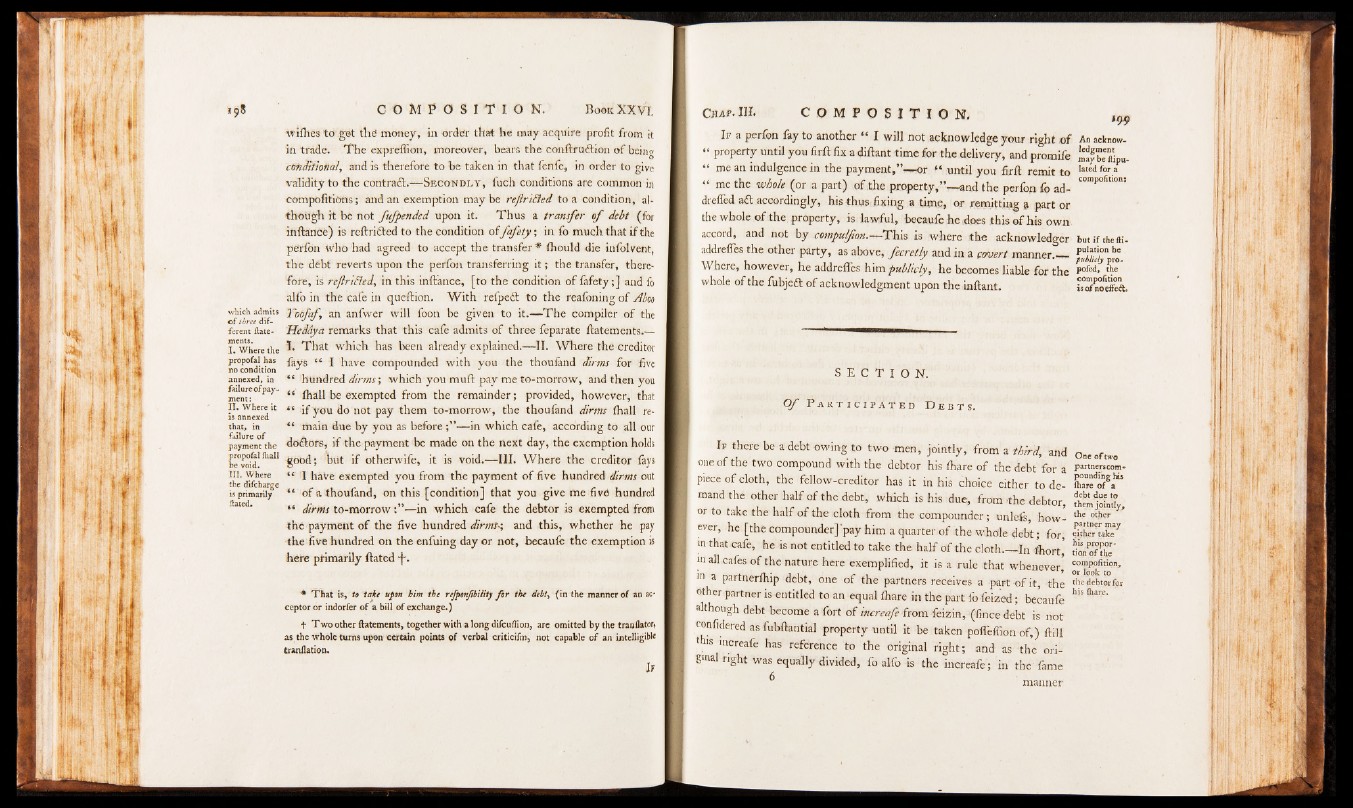
wiflies to get the money, in order that he may acquire profit from it
in trade. The expreflion, moreover, bears the conftrudtion of being
cotidiiioHal, and is therefore to be taken in that fenfe, in order to give
validity to the contrail.— Se c o n d l y , fuch conditions are common in
compofitiöns; and an exemption may be rejir idled to a condition, although
it be not fufpended upon it. Thus a transfer o f debt (for
inftarice) is reftrifted to the condition offafety; in fo much that if the
perfbn Who had agreed to accept the transfer * lhould die infolvent,
the debt reverts upon the perfon transferring i t ; the transfer, therefore,
is reflridled, in this inftance, [to the condition of fafety;] and fo
alfo in the cafe in queftion. With refpeét to the reafoning of Aboo
which admits fotifaf, an anfwer will foon be given to it.— The compiler of the
o f three dif- J 7 0 . *
ferent ftate- Headya remarks that this cafe admits of three feparate llatements.—
j , where the 1* That which has been already explained.— I I . Where the creditor
propofal has fays “ j have compounded with you the thouland dirms for five
no condition J 1 J
annexed, in “ hundred dirms', which you muft pay me to-morrow, and then you
ment:°fpay" “ Ihdll be exempted from the remainder; provided, however, that
II. where it n jf yOU r]0 not nay them to-morrow, the thoufand dirms fhall re-
is annexed J % J
that, in “ main due by you as before — in which cafe, according to all our
payment the dödtöfs, if the payment be made on the next day, the exemption holds
b e v o i d ' g ° ° d 5 but if otherwife, it is void.— III. Where the creditor fays
ill. where “ 1 have exempted you from the payment of five hundred dirms out
the difcharge , _ . _ • r
is primarily “ of ft thouland, on this [condition J that you give me nvd hundred
“ dirms to -m o r r ow — in which cafe the debtor is exempted from
the payment of the five hundred dirmS-^ and this, whether he pay
the five hundred on the enfuing day or not, becaufe the exemption is
here primarily ftated -j-.
* T h a t is, to take upon him the refponjibility fo r the debt, ( in the manner o f an acceptor
o r indorfer o f a bill o f exchange.)
f T w o other ftatements, together w ith a long difcuffion, are omitted b y the tranflator,
as the whole turns upon certain points o f verbal criticifm, not capable o f an intelligible
t r inflation.
I f
If a perfon fay to another “ I will not acknowledge your right of
“ property until you fir ft fix a diftant time for the delivery, and promife
“ me an indulgence in the payment,”—or « until you firft remit to
“ me the whole (or a part) of the property,”—and the perfon fo ad-
dreffed a£l accordingly, his thus fixing a rime, or remitting a part or
the whole of the property, is lawful, becaufe he does this of his own
accord, and not by compuljion.'—This is where the acknowledger
addrefles the other party, as above, fecretly and in a covert manner.—
Where, however, he addrefles him publicly, he becomes liable for the
whole of the fubjedt of acknowledgment upon the inftant.
S E C T I O N .
0 / P a r t i c i p a t e d D e b t s .
If there be a debt owing to two men, jointly, from a third, and
one of the two compound with the debtor his fhare of the debt for a
piece of cloth, the fellow-creditor has it in his choice either to demand
thé other half of the debt, which is his due, from -the debtor,
or to take the half of the cloth from the compounder; unlefs, however,
he [the compounder] pay him a quarter of the whole debt; for,
in that cafe, he is not entitled to take the half of the cloth.—In
f t a11 cafes of the nature here exemplified, it is a rule that whenever,’
m a partnerfhip debt, one of the partners receives a part of it, the
other partner is entitled to an equal fhare in the part fo feized; becaufe
although debt become a fort of increafe from feizin, (fince debt is not
confidered as fubftantial property until it be taken poffeffion of,) ftill
this increafe has reference to the original right; and as the original
right was equally divided, fo alfo is the increafe; in the fame
6
An acknowledgment
may be ftipu*
lated for a
compofition:
but i f the fti-
pulation be
publicly pro-
pofed, the
compofition
is of no effeft.
One o f two
partnerscom-
poundfng his
fhare of a
debt due to
them jointly,
the other
partner may
either take
His proportion
o f the
compofition,
or look to
the debtor for
his fhare.
manner